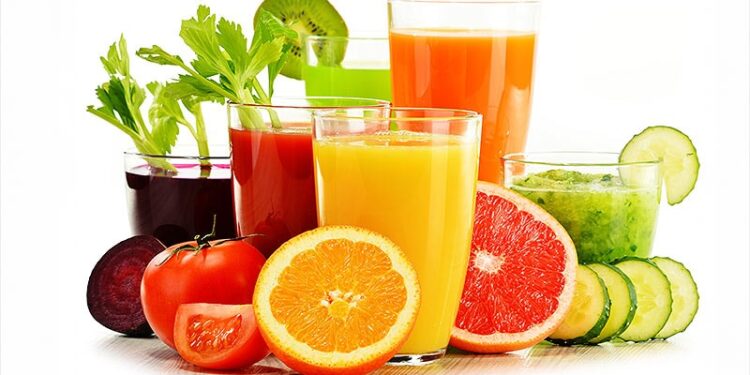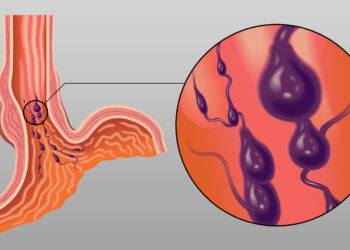“It’s a great way to get those fruits and vegetables into my diet, especially since I can’t be bothered peeling or preparing them…” “I lost weight and felt lighter…” “I’m helping my body detox, and that’s a good feeling.”
Social media is rife with statements like the above about juice cleanses. It’s a favorite topic as well as something patients often ask about. The perception is that by doing a juice cleanse, they’re doing something healthy for themselves — yet experts agree that in most cases, they’re not. But if they’re having a conversation or asking about it, it offers an opportunity to provide evidence-based guidance.
American Gastroenterological Association Spokesperson Fazia Mir, MD, clinical assistant professor at the University of New Mexico and a gastroenterologist with Presbyterian Healthcare Services, both in Albuquerque, New Mexico, said some of her patients ask about juice cleanses because they’re interested in doing a liver detox or helping their gut inflammation.
“I tell them that, in fact, it does the opposite,” she told Medscape Medical News.
“The majority of juice cleanses impact gut health negatively. They can cause bowel habit irregularity and even precipitate inflammatory bowel disease, as the gut microbiota is disrupted due to the lack of fiber in these cleanses. And we see patients all the time whose irritable bowel syndrome worsens after they’ve embarked on a juice cleanse.”
What the Evidence Says
There’s little evidence to support the use of juice cleanses for eliminating toxins from the body, according to the US National Center for Complementary and Integrative Health. Furthermore, some juices used in “detoxes” and “cleanses” haven’t been pasteurized or treated in other ways to kill harmful bacteria, meaning they can expose individuals to toxigenic E coli, Salmonella, hepatitis A, and Cryptosporidium.
In addition, some juices are made from foods high in oxalate, such as leafy green vegetables and beets. Individuals susceptible to kidney stone formation should limit their consumption of high-oxalate foods, which can present a health threat.
In fact, a case report published several years ago documented acute oxalate nephropathy caused by a “green smoothie cleanse” prepared from juicing oxalate-rich green leafy vegetables and fruits.
‘Reality Check’
Two recent studies highlight the negative impact of juice cleanses. In a small randomized, three-arm intervention study with 14 healthy participants published online in Nutrients, “a 3-day exclusive juice cleanse (800-900 kcal/d) led to shifts in the oral and gut microbiome, with increases in taxa linked to inflammation, gut permeability, and even cognitive decline after juice consumption,” said principal author Melinda Ring, MD, executive director, Osher Center for Integrative Health at Northwestern University in Chicago.
Participants followed one of three diets — juice only, juice plus food, or plant-based food — for 3 days. Microbiota samples (stool, saliva, and inner cheek swabs) were collected at baseline, after a pre-intervention elimination diet, immediately after the juice intervention, and 14 days after the intervention. Gene sequencing was used to analyze microbiota taxonomic composition.
The juice-only group showed the most significant increase in bacteria associated with inflammation and gut permeability, as well as associated changes in the saliva and cheek microbiota — particularly in the relative abundances of proinflammatory
bacterial families. These changes are potentially due to the high sugar and low fiber intake of the juice-related products, the authors suggested.
Ring said the study “offers a reality check” on juice cleanses. “Whether a cleanse is ‘healthy’ depends on the individual and the intent behind it,” she told Medscape Medical News. “A short, structured cleanse, ideally lasting no more than 1-3 days, can be safe for many people if it focuses on polyphenol-rich, low-sugar vegetables rather than fruit, retains some fiber (as in blended rather than pressed juices), and avoids extreme calorie restriction.”
Pediatricians should also be aware that a high-sugar, low-fiber diet may promote the growth of pro-inflammatory taxa, first author Maria Luisa Savo Sardaro, PhD, a professor of food microbiology at San Raffaele University in Rome, Italy, told Medscape Medical News.
“Families often rely on juice boxes in lunch packs, believing they’re a healthy substitute for whole fruit, and school cafeterias frequently offer sugary drinks throughout the day,” she said. “Together, these habits may contribute to an early life increase of inflammation in children.”
Change Dietary Guidelines?
Although it did not address juice cleanses per se, a new review published online in Nutrition Bulletin specifically compared evidence on whole fruit and 100% fruit juice with regard to nutrient composition, impact on hunger and satiety, and association with chronic health conditions.
Lead author Hemangi Mavadiya, a PhD candidate at the Joe C. Wen School of Population & Public Health, University of California Irvine, Irvine, California, said that, like the Nutrients study, the review of 83 studies found juicing does indeed remove much of the dietary fiber that has beneficial effects on the gut. In addition, processing and/or storing 100% fruit juice reduces vitamins and other antioxidant contents and transforms intrinsic sugars in the whole fruit into free sugars, which have little nutritional benefit.
Furthermore, fruit consumed in solid form provides greater satiety due to delayed gastric emptying and related physiological reactions, and “the synergistic effects of polyphenols and fiber in whole fruit benefit the gut microbiome by acting as prebiotics and producing short-chain fatty acids that reduce inflammation,” the authors wrote.
The review also showed that consuming high amounts of fruit juice is associated with increased risks for certain types of cancer, while results were mixed for type 2 diabetes and hypertension.
As a result of their findings, the authors recommended that the next version of the next set of Dietary Guidelines for Americans, coming out at the end of 2025, be updated to better reflect the amount of whole fruit and 100% fruit juice adults and children should consume. Current guidelines recommend that at least half of the daily recommended fruit intake of two cups a day should come from whole fruits, potentially allowing the other half to be fulfilled by 100% fruit juice.
Tips for Patients
What are clinicians telling their patients regarding juice cleanses? “When used as a bridge to more sustainable, whole-food, high-fiber eating habits, a brief cleanse might serve as a motivational tool,” Ring said. “However, clinicians should counsel patients that detoxification is a natural, ongoing function of the liver and kidneys, not something that requires commercial juice products.”
Patients should also be told that juice cleanses may temporarily disrupt the body’s microbial balance, likely due to their high sugar and low fiber content and may not support long-term gut health. “Cleanses may offer a psychological ‘reset,’ but without adequate fiber and protein, they could undermine microbial diversity and resilience, especially if repeated or prolonged.”
Patients who love juicing can consider blending instead, to keep the fiber intact, or pairing juices with whole foods to balance the impact on the microbiome, she suggested.
Mavadiya advises patients read food labels, which can help distinguish between fruit juice and fruit drinks, since the latter “is loaded with added sugars,” and it’s easy to confuse the two.
“Ultimately, the healthiest path forward is not a periodic cleanse, but a consistent, nutrient-dense, fiber-rich diet that supports gut and systemic health over the long term,” Ring concluded. Furthermore, clinicians should assess for underlying conditions such as diabetes, eating disorders, or frailty, which may make juice cleanses inadvisable.
No conflicts of interest were declared.
Marilynn Larkin, MA, is an award-winning medical writer and editor whose work has appeared in numerous publications, including Medscape Medical News and its sister publication MDedge, The Lancet (where she was a contributing editor), and Reuters Health.
Source link : https://www.medscape.com/viewarticle/juice-cleanses-likely-good-nothing-bad-much-2025a1000dgz?src=rss
Author :
Publish date : 2025-05-28 11:04:00
Copyright for syndicated content belongs to the linked Source.














